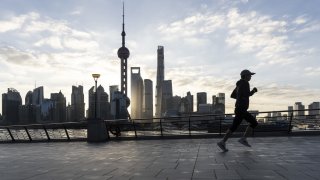
A pedestrian jogs along the Bund across from buildings in Pudong’s Lujiazui Financial District in Shanghai, China, on Thursday, Jan. 2, 2025.
This is CNBC's live blog covering Asia-Pacific markets.
Asia-Pacific markets traded mostly lower Wednesday after Wall Street declined overnight as investors assessed quarterly earnings, while tariff worries continued to weigh on investor sentiment.
Watch NBC6 free wherever you are
Hong Kong's Hang Seng Index fell 1.91% to close at 21,056.98. Mainland China's CSI 300 added 0.31% to close at 3,772.82, after China's economy expanded by a better-than-expected 5.4% in the first quarter. This comes even as U.S. tariff threats have prompted major investment banks to slash the country's annual growth outlook. Reuters' economists had expected a 5.1% expansion year on year.
Japan's Nikkei 225 fell 1.01% to close at 33,920.4. South Korea's Kospi fell 1.21% to close at 2,447.43 while the small-cap Kosdaq lost 1.80% to end the trading day at 699.11.
Get local news you need to know to start your day with NBC 6's News Headlines newsletter.
Australia's S&P/ASX 200 closed the trading day at 7,758.9.
UBS recently downgraded its GDP forecast for China to 3.4% for 2025, and to 3% next year. The investment bank's chief China economist, Tao Wang, estimates that tariff hikes imposed by the U.S. on Chinese goods will cause a more than 2 percentage points drag on China's GDP growth.
Bloomberg on Tuesday reported that China had ordered all airlines to halt deliveries of Boeing jets amid a tit-for-tat tariff war with the U.S. This move could increase chances of a negotiation, according to Louis Navellier, founder and chairman of Navellier & Associates.
Money Report
"The probability of a resolution of the trade spat between China and the U.S. is now expected since Boeing and the technology industry are likely putting pressure on the White House," said Navellier.
U.S. stock futures slipped as investors looked ahead to the release of a key retail sales report and more earnings from the first-quarter season. Dow Jones Industrial Average futures dropped 139 points, or 0.3%. S&P 500 futures and Nasdaq 100 futures dipped 0.7% and 1.1%, respectively.
Overnight in the U.S., the three major averages fell. The Dow Jones Industrial Average lost 155.83 points, or 0.38%, to close at 40,368.96. The S&P 500 declined 0.17% and ended at 5,396.63. The Nasdaq Composite ticked down 0.05% and settled at 16,823.17. The three averages slipped following back-to-back winning sessions.
— CNBC's Alex Harring and Lisa Kailai Han contributed to this report.
Tokyo has ‘many cards’ to play in U.S. tariff negotiations, says Japanese economic advisor
Japan has "many cards" to play in tariff negotiations with the United States, according to Takeshi Niinami, senior economic advisor to Japan's prime minister.
His comments comes ahead of a three-day trip by top negotiator Ryosei Akazawa to the U.S. for talks with U.S. Treasury Secretary Scott Bessent and U.S. Trade Representative Jamieson Greer.
Niinami, who is also chairman and CEO of Japanese drinks manufacturer Suntory Holdings, told CNBC's "Squawk Box Asia" that he is "cautiously optimistic" about the trade talks.
He pointed out that Japan has been the biggest foreign investor in the U.S. and the largest foreign holder of U.S. Treasury bonds.
Read the full story here.
—Lim Hui Jie
China replaces top trade negotiating official as talks with Washington stall
China on Wednesday appointed Li Chenggang as vice minister of commerce and a top representative for international trade negotiation, according to an official statement, replacing Wang Shouwen.
The appointment makes Li a key member of China's trade negotiation team as Beijing deals with trade disputes with the U.S. So far, there have not been any sign of near-term trade talks as both sides have ratcheted up tariff tensions.
Li was among the Chinese officials who met with several top entrepreneurs last month in a symposium that sought to address the concerns of private companies after President Xi Jinping in February expressed his support for businesses.
Read the full story here.
—Anniek Bao
Hong Kong stocks fall over 2%, dragged by technology and consumer cyclicals
Hong Kong's Hang Seng Index fell over 2%, dragged by consumer cyclicals and technology stocks.
Chinese e-commerce giant Meituan was leading the index's losses, falling 6.74% as of 11.13am local time.
Other index heavyweights JD.Com and Alibaba lost 5.94% and 4.09% respectively. Kuaishou Technology declined 6.45%.
—Lee Ying Shan
China's first-quarter GDP tops estimates at 5.4% as growth momentum continues amid tariff worries
China's economy expanded by a better-than-expected 5.4% in the first quarter, maintaining a strong momentum, even as U.S. tariff threats have prompted major investment banks to slash the country's annual growth outlook.
The first-quarter GDP topped Reuters' poll expectations for a 5.1% growth year on year, building on a recovery that began in late 2024, thanks to a broad policy stimulus push.
Retail sales in March rose by 5.9% year on year, sharply beating analysts' estimates for a 4.2% growth. Industrial output expanded by 7.7% from a year earlier, versus median estimates of 5.8%.
Read the full story here.
—Anniek Bao
Asia chip stocks fall after Nvidia flags $5.5 billion costs in exporting to China
Asian semiconductor-related stocks fell after Nvidia said that it will take a quarterly charge of around $5.5 billion tied to exporting H20 graphics processing units to China and other destinations.
Semiconductor testing equipment supplier Advantest fell 5.34%. Japanese technology conglomerate Softbank which owns a stake in chip designer Arm, saw shares tumble over 1%.
In South Korea, SK Hynix fell over 2%. Samsung Electronics lost 2.47%.
Taiwan Semiconductor Manufacturing Corp fell 1.14%. Taiwan's Hon Hai Precision Industry, known internationally as Foxconn, was down 1.43%.
—Lee Ying Shan
Gold hits another record high amid tariff uncertainty
Gold prices climbed to another fresh all-time high amid tariff uncertainties, with spot gold rising to 3,261.62 per ounce, according to LSEG data.
Gold futures on the U.S. Commodity Exchange were up 0.63% at $3,261.6 per ounce.
"We believe risk-off purchases for gold are yet to pick up. Increasing downside risks for equity markets will see institutional investors increasing allocation to gold," ANZ's analysts wrote in a research note published Wednesday. The investment bank sees gold prices going towards $3,400 per ounce.
— Lee Ying Shan
Stocks close lower
Stocks finished Tuesday in the red.
The Dow closed 0.4% lower. The S&P 500 and Nasdaq Composite shed roughly 0.2% and 0.1%, respectively.
— Alex Harring
Gold miners hit highest level since 2012
The VanEck Gold Miners ETF (GLD) advanced 0.6% Tuesday, reaching its highest point since November 2012.
Some of the companies in the fund at new 52-week highs include Alamos Gold, AngloGold, Agnico Eagle and Endeavour Mining.
The surge higher comes as gold prices have surged in 2025, due to a surge in safe-haven demand as Trump's tariff policies spark uncertainty in the market.
— Hakyung Kim, Gina Francolla
Market isn't 'out of the woods yet' with volatility around tariffs, Piper Sandler says
Stocks may be due for more chaotic moves with tariff uncertainty, according to Piper Sandler.
"Technically, we are 'not out of the woods yet,' as we'd like to see the SPX recover its March lows and make another ascent toward its 50-/200-day MAs at around 5,750-5,800," analyst Craig Johnson wrote in a Tuesday note. "Investors are returning to the equity market despite the crosscurrents in the macro picture."
"We expect investors to temporarily shift their attention to earnings and away from tariffs, allowing the macro picture to settle down in the upcoming weeks," he continued.
— Sean Conlon






